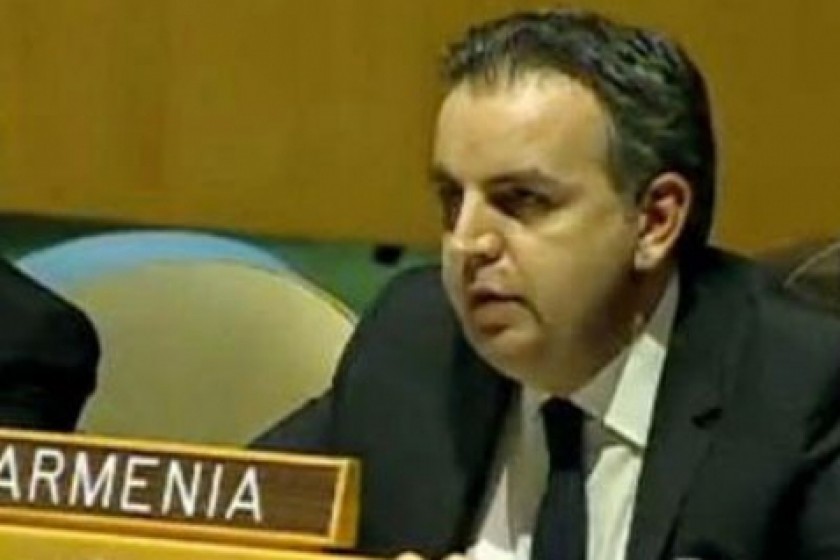
Armenia's U.N. Vote on Crimea: Tallying the Pluses and Minuses
So what has Armenia lost, or gained, by voting against a UN resolution reaffirming Ukraine’s territorial integrity yesterday?
By doing so, Armenia joined a club of nations including North Korea, Sudan, Syria, Venezuela and Belarus. In all, eleven countries voted against the resolution and 100 supported it.
The fact that Armenia made a last minute reversal, given that Armenia’s Foreign Minister had RFE/RL’s Armenian Service (Azatutyun.am) that Armenia was likely to abstain, can probably be ascribed to direct pressure exerted by Moscow.
Those countries that voted against the resolution are regarded by the international community as having authoritarian regimes for whom having friendly bilateral relations with Russia is of vital importance – primarily in order to maintain power at home.
So their vote against the resolution can be seen as an attempt not to damage such relations rather than a principled stand in defense of the right of Crimea to self-determination. They voted the way they did simply because Moscow expected them to do so.
Not wishing to damage Armenia-Russian relations also played a major factor in Yerevan’s vote. But it is clear that Armenia, based on principles alone, had the moral and political right to vote against the resolution given its content.
At issue wasn’t about joining Crimea to Russia, but rather the legitimacy of the referendum. Via the General Assembly resolution, Ukraine was proposing that the referendum in Crimea be declared null and void and that it could not serve as the basis for making any changes to the status of the Crimea Autonomous Republic.
In other words, in this case at issue were the referendum and the recognition of the people’s right to self-determination. This in turn, answers the question as to whether Crimea had the right to hold the referendum and the right to declare its independence as a result.
Had Armenia voted in favor of the resolution, whether wanting to or not, it would have defended the principle of territorial integrity and border inviolability. And this stands opposed to the policy of Armenia in its quest to gain the recognition of the international community regarding the independence and sovereignty of the Mountainous Karabagh Republic (Artsakh).
Indirectly, this would have meant not recognizing the 1991 referendum in Nagorno-Karabagh, which, in terms of the letter and spirit of international rights, cannot be compared with any similar referendum or self-determination process that has occurred before or since.
Azerbaijan also has issues regarding relations with Russia. But Baku voted in favor of the General Assembly resolution supporting the territorial integrity of Ukraine. It had no choice given that it regards Artsakh as an “occupied” piece of its territory. If the international community understands the position of Baku, then it must also understand why Armenia voted the way it did.
Of course, it is possible to argue that what took place in Crimea wasn’t a real referendum since it took place under the barrels of Russian machine guns. This is true.
But equally true is that a majority of Crimea residents willingly voted in favor of independence, with the prospect of eventually joining Russia. Secondly, had Russian troops not been present in Crimea, Ukrainian troops would have been there instead.
In that case, if the population of Crimea expressed a desire to hold a referendum and if the authorities in Kiev had exerted pressure against it, would the international community have labeled this a violation of a citizen’s right to free expression? The answer to this is more than clear.
But most important is the fact that in today’s world principles aren’t essential, international rights, but how they are interpreted. And if political policy research centers feel the need, they will draw parallels whether we like it or not, with all the resultant consequences.
Thus, what is mentioned above does not mean that Armenia was obliged to vote against the U.N. resolution and that it was the more correct decision, regardless of whether it had the political and moral right to do so.
Real politick is much more cruel and multi-layered than evaluating the truth through a prism of right or wrong. From this perspective, the best solution would have been for Armenia to abstain from voting.
By abstaining, Armenia wouldn’t have contradicted the principled approach in favor of defending the right of self-determination.
Secondly, Armenia would have shown that it is capable of conducting a somewhat independent foreign policy.
Finally, Armenia would have avoided burning its bridges of developing constructive relations with the West and associating itself with authoritarian states.
By this vote, it appears that Armenia has finally decided its foreign policy orientation, which precludes having any orientation of its own other than conveniently finding its place under the Russian table.
 Videos
Videos Photos
Photos




Comments (3)
Write a comment